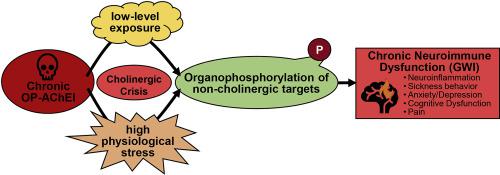当前位置:
X-MOL 学术
›
Neuropharmacology
›
论文详情
Our official English website, www.x-mol.net, welcomes your feedback! (Note: you will need to create a separate account there.)
Acetylcholinesterase inhibitor exposures as an initiating factor in the development of Gulf War Illness, a chronic neuroimmune disorder in deployed veterans.
Neuropharmacology ( IF 4.7 ) Pub Date : 2020-04-02 , DOI: 10.1016/j.neuropharm.2020.108073 Lindsay T Michalovicz 1 , Kimberly A Kelly 1 , Kimberly Sullivan 2 , James P O'Callaghan 1
Neuropharmacology ( IF 4.7 ) Pub Date : 2020-04-02 , DOI: 10.1016/j.neuropharm.2020.108073 Lindsay T Michalovicz 1 , Kimberly A Kelly 1 , Kimberly Sullivan 2 , James P O'Callaghan 1
Affiliation

|
Gulf War Illness (GWI) is a chronic multi-symptom disorder, characterized by symptoms such as fatigue, pain, cognitive and memory impairment, respiratory, skin and gastrointestinal problems, that is experienced by approximately one-third of 1991 Gulf War veterans. Over the nearly three decades since the end of the war, investigators have worked to elucidate the initiating factors and underlying causes of GWI. A significant portion of this research has indicated a strong correlation between GWI and exposure to a number of different acetycholinesterase inhibitors (AChEIs) in theater, such as sarin and cyclosarin nerve agents, chlorpyrifos and dichlorvos pesticides, and the anti-nerve agent prophylactic pyridostigmine bromide. Through studying these exposures and their relationship to the symptoms presented by ill veterans, it has become increasingly apparent that GWI is the likely result of an underlying neuroimmune disorder. While evidence indicates that AChEIs are a key exposure in the development of GWI, particularly organophosphate AChEIs, the mechanism(s) by which these chemicals instigate illness appears to be related to "off-target", non-cholinergic effects. In this review, we will discuss the role of AChEI exposure in the development and persistence of GWI; in particular, how these chemicals, combined with other exposures, have led to a chronic neuroimmune disorder. This article is part of the special issue entitled 'Acetylcholinesterase Inhibitors: From Bench to Bedside to Battlefield'.
中文翻译:

乙酰胆碱酯酶抑制剂暴露是海湾战争疾病发展的起始因素,海湾战争疾病是部署退伍军人的慢性神经免疫疾病。
海湾战争病 (GWI) 是一种慢性多症状疾病,其特征是疲劳、疼痛、认知和记忆障碍、呼吸、皮肤和胃肠道问题等症状,大约三分之一的 1991 年海湾战争退伍军人经历过这种疾病。自战争结束以来的近三年时间里,调查人员一直致力于阐明 GWI 的始发因素和根本原因。这项研究的很大一部分表明 GWI 与在剧院中接触许多不同的乙酰胆碱酯酶抑制剂 (AChEI) 之间存在很强的相关性,例如沙林和环沙林神经毒剂、毒死蜱和敌敌畏杀虫剂,以及抗神经毒剂预防性溴化吡啶斯的明. 通过研究这些暴露及其与生病退伍军人表现出的症状的关系,越来越明显的是,GWI 可能是潜在神经免疫疾病的结果。虽然有证据表明 AChEI 是 GWI 发展的关键暴露,尤其是有机磷 AChEI,但这些化学物质引发疾病的机制似乎与“脱靶”、非胆碱能作用有关。在这篇综述中,我们将讨论 AChEI 暴露在 GWI 发展和持续中的作用;特别是,这些化学物质与其他暴露结合如何导致慢性神经免疫疾病。本文是题为“乙酰胆碱酯酶抑制剂:从工作台到床边再到战场”特刊的一部分。虽然有证据表明 AChEI 是 GWI 发展的关键暴露,尤其是有机磷 AChEI,但这些化学物质引发疾病的机制似乎与“脱靶”、非胆碱能作用有关。在这篇综述中,我们将讨论 AChEI 暴露在 GWI 发展和持续中的作用;特别是,这些化学物质与其他暴露结合如何导致慢性神经免疫疾病。本文是题为“乙酰胆碱酯酶抑制剂:从工作台到床边再到战场”特刊的一部分。虽然有证据表明 AChEI 是 GWI 发展的关键暴露,尤其是有机磷 AChEI,但这些化学物质引发疾病的机制似乎与“脱靶”、非胆碱能作用有关。在这篇综述中,我们将讨论 AChEI 暴露在 GWI 发展和持续中的作用;特别是,这些化学物质与其他暴露结合如何导致慢性神经免疫疾病。本文是题为“乙酰胆碱酯酶抑制剂:从工作台到床边再到战场”特刊的一部分。我们将讨论 AChEI 暴露在 GWI 发展和持续中的作用;特别是,这些化学物质与其他暴露结合如何导致慢性神经免疫疾病。本文是题为“乙酰胆碱酯酶抑制剂:从工作台到床边再到战场”特刊的一部分。我们将讨论 AChEI 暴露在 GWI 发展和持续中的作用;特别是,这些化学物质与其他暴露结合如何导致慢性神经免疫疾病。本文是题为“乙酰胆碱酯酶抑制剂:从工作台到床边再到战场”特刊的一部分。
更新日期:2020-04-02
中文翻译:

乙酰胆碱酯酶抑制剂暴露是海湾战争疾病发展的起始因素,海湾战争疾病是部署退伍军人的慢性神经免疫疾病。
海湾战争病 (GWI) 是一种慢性多症状疾病,其特征是疲劳、疼痛、认知和记忆障碍、呼吸、皮肤和胃肠道问题等症状,大约三分之一的 1991 年海湾战争退伍军人经历过这种疾病。自战争结束以来的近三年时间里,调查人员一直致力于阐明 GWI 的始发因素和根本原因。这项研究的很大一部分表明 GWI 与在剧院中接触许多不同的乙酰胆碱酯酶抑制剂 (AChEI) 之间存在很强的相关性,例如沙林和环沙林神经毒剂、毒死蜱和敌敌畏杀虫剂,以及抗神经毒剂预防性溴化吡啶斯的明. 通过研究这些暴露及其与生病退伍军人表现出的症状的关系,越来越明显的是,GWI 可能是潜在神经免疫疾病的结果。虽然有证据表明 AChEI 是 GWI 发展的关键暴露,尤其是有机磷 AChEI,但这些化学物质引发疾病的机制似乎与“脱靶”、非胆碱能作用有关。在这篇综述中,我们将讨论 AChEI 暴露在 GWI 发展和持续中的作用;特别是,这些化学物质与其他暴露结合如何导致慢性神经免疫疾病。本文是题为“乙酰胆碱酯酶抑制剂:从工作台到床边再到战场”特刊的一部分。虽然有证据表明 AChEI 是 GWI 发展的关键暴露,尤其是有机磷 AChEI,但这些化学物质引发疾病的机制似乎与“脱靶”、非胆碱能作用有关。在这篇综述中,我们将讨论 AChEI 暴露在 GWI 发展和持续中的作用;特别是,这些化学物质与其他暴露结合如何导致慢性神经免疫疾病。本文是题为“乙酰胆碱酯酶抑制剂:从工作台到床边再到战场”特刊的一部分。虽然有证据表明 AChEI 是 GWI 发展的关键暴露,尤其是有机磷 AChEI,但这些化学物质引发疾病的机制似乎与“脱靶”、非胆碱能作用有关。在这篇综述中,我们将讨论 AChEI 暴露在 GWI 发展和持续中的作用;特别是,这些化学物质与其他暴露结合如何导致慢性神经免疫疾病。本文是题为“乙酰胆碱酯酶抑制剂:从工作台到床边再到战场”特刊的一部分。我们将讨论 AChEI 暴露在 GWI 发展和持续中的作用;特别是,这些化学物质与其他暴露结合如何导致慢性神经免疫疾病。本文是题为“乙酰胆碱酯酶抑制剂:从工作台到床边再到战场”特刊的一部分。我们将讨论 AChEI 暴露在 GWI 发展和持续中的作用;特别是,这些化学物质与其他暴露结合如何导致慢性神经免疫疾病。本文是题为“乙酰胆碱酯酶抑制剂:从工作台到床边再到战场”特刊的一部分。



























 京公网安备 11010802027423号
京公网安备 11010802027423号